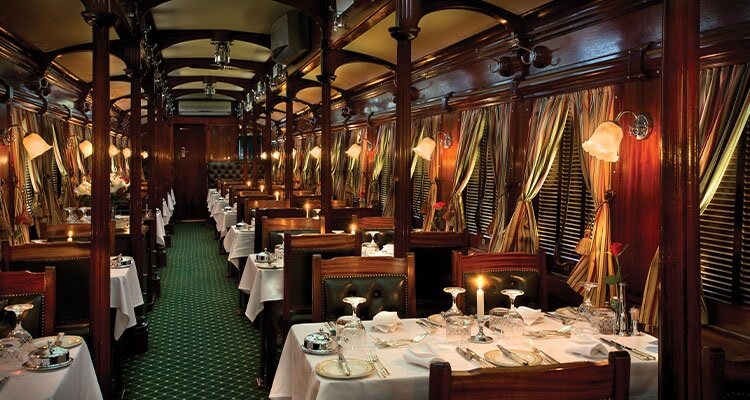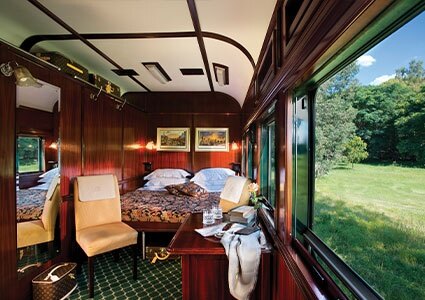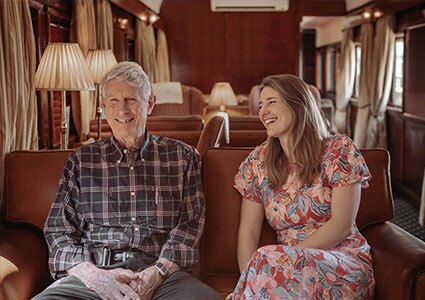
The story of determination behind Rovos Rail’s unforgettable journeys through Southern Africa
For many of us, traveling through the diverse and dynamic landscape of Southern Africa on a luxurious train is a once-in-a-lifetime, bucket-list trip. Since its foundation in 1989, Rovos Rail (Rovos) has earned a strong global reputation for exactly that – world-class, luxury travel experiences via bespoke train journeys that highlight the best the continent has to offer.
From a three-night meander to see Victoria Falls, one of the natural wonders of the world, to a spectacular 15-night adventure from Cape Town to Dar es Salaam, Rovos links some of the greatest destinations with a variety of off-train excursions. Not to mention that passengers travel aboard beautifully rebuilt trains with vintage, wood-paneled coaches, hauled by locomotives that are increasingly powered by electric amid demand for sustainable travel.
Guests can sit back and relax as some of the most varied scenery in the world unfolds beyond the windows. With discreet and friendly service, top cuisine, and a selection of South Africa’s finest wines, every aspect of a journey with Rovos is centered around the passenger experience, which draws upon the elegance and high romance era of travel and exploration.
Full steam ahead
 Behind Rovos’ timeless passenger offering is a unique story of a family determined to succeed in showing the world the beauty of South Africa, and now nine other African countries. As Rovos prepares to celebrate its 35th anniversary in April 2024, Tiffany Vos-Thane, COO at Rovos, joins us to discuss how her father, Rohan Vos, built a company from the ground up while raising a family in and around the business with his wife, Anthea.
Behind Rovos’ timeless passenger offering is a unique story of a family determined to succeed in showing the world the beauty of South Africa, and now nine other African countries. As Rovos prepares to celebrate its 35th anniversary in April 2024, Tiffany Vos-Thane, COO at Rovos, joins us to discuss how her father, Rohan Vos, built a company from the ground up while raising a family in and around the business with his wife, Anthea.
“My father had always been fascinated by mechanical engineering; pretty much anything with an engine was of interest to him,” Tiffany opens. “He successfully ran an auto spare parts business from the age of 18 right up until he founded Rovos. During that time, he was introduced to a steam society and got to know everything about steam locomotives, as at the time, trains were still being hauled by steam locomotion.
“Steam trains are some of the most magnificent machines; they look and sound beautiful with an allure, beauty, grace, and glamor that immediately captures your attention, regardless of how much you care for trains. As my father got more involved in the society, he realized his dream to take his family around South Africa by train to explore the country’s beauty.
“However, he quickly understood that he wouldn’t be able to afford to do so on existing rail networks. My father is one of those people who constantly needs a project and combined with his interest in trains and passion for mechanics, he eventually made the decision to build his own train and sell tickets for excursions.
“Of course, looking back, he made an incredibly fortuitous decision, but the early days were really tough, as it was pre-Nelson Mandela when South Africa wasn’t even on the map as a tourist destination,” she reflects. “Despite the circumstances, he started out with one small train traveling between Pretoria and Kruger and it took five years or so for there to be any traction at all, by which time my parents had reinvested all profits and were close to bankruptcy.”
Memorable journeys
With a family of four young children, the disenchantment and worry Rohan and Anthea would have felt is unimaginable. Still determined to make the business a success, Rohan signed a deal with British travel agent, Jules Verne, which unbeknown to him went on to be a catalyst in spurring the business forward for a stable, prosperous future.
“I can remember it as though it was yesterday,” Tiffany recalls. “The package, a train journey from Cape Town to Victoria Falls, was advertised in a UK newspaper, the Sunday Telegraph, in late December, and I can remember him answering a call with trepidation, which suddenly faded away as Jules Verne told him that sales were going extremely well, and they had sold tickets for nearly four full trains.
“So, we avoided bankruptcy by a whisker, and fast-forward to today, we’re gearing up to celebrate our 35th anniversary in business. To exemplify how he turned the company around back then, we acquired 38 redundant rail carriages from South African Railways. We started to travel to different places and launched our now renowned 16-day trip from Cape Town to Dar es Salaam, which is still my favorite trip we offer.
“As kids, we grew up on trains while my parents were working. At one time, they were the only staff, so my father managed the train and my mother helped to clean rooms. Although I’ve done the journey between Cape Town and Dar es Salaam more times than I can remember, it’s still my favorite because it captures the essence of five different African countries, with so much activity like traveling across the Zambezi Bridge and visiting large falls.
“Although that’s my personal favorite, any journey we offer promises to provide a memorable experience both on and off board,” she states. “It’s crucial that people know they’re visiting Africa. We’re refocusing our branding this year to emphasize traveling in and around Africa, as well as setting the tone for passengers coming aboard our vintage trains, which hold a lot of history and can transport guests back to the Edwardian era.”
Seamless guest experience
As part of its mission to deliver luxury travel,  Rovos must ensure its coaches and suites provide ultimate comfort. “In terms of the design, we wanted to create a five-star luxury hotel on wheels with a focus on comfort,” Tiffany explains. “Another element of the design was privacy. Many of our guests leave positive feedback on not only the travel experience itself, but also the bonds it allows them to create with other passengers. However, while some guests want to socialize with other passengers, read books, or play games in the lounge cars, some want to simply relax with their loved ones, so we needed to be able to provide several options to satisfy various preferences.
Rovos must ensure its coaches and suites provide ultimate comfort. “In terms of the design, we wanted to create a five-star luxury hotel on wheels with a focus on comfort,” Tiffany explains. “Another element of the design was privacy. Many of our guests leave positive feedback on not only the travel experience itself, but also the bonds it allows them to create with other passengers. However, while some guests want to socialize with other passengers, read books, or play games in the lounge cars, some want to simply relax with their loved ones, so we needed to be able to provide several options to satisfy various preferences.
“We were one of the first trains to introduce fixed beds and ensuite bathrooms, for example, and even today, we boast the world’s largest suites onboard a train. In terms of products, my mother was passionate about supporting local economies, so all our products are made in South Africa, from our wine and glassware to our linens – the only thing we import are in-demand spirits. Our design ensures that from the moment guests arrive to the end of their trip, they can expect luxury features and a high level of professionalism.”
With comfort in mind, Rovos carefully plans excursions that are close to the rail tracks so that guests can relax without worrying about transport or distance. “Our train journeys are a great way to experience a country, as you can see vast landscapes and travel huge distances from the comfort of a beautiful suite,” Tiffany states. “We’ve created and curated excursions ranging from cultural and historical to trips that revolve around food or wine. We try to ensure that excursions are within a close distance to the train to enable a seamless guest experience.”
Showcasing South Africa
When it comes to sustainability, Rohan is again to thank for foreseeing the environmental problems with locomotives. “My father saw the writing on the wall; we traveled through African countries, many of which were, and some still are, going through various financial and economic problems,” Tiffany proposes. “He started investing in cylinder diesel locomotives,
and acquired five electric locomotives, some of which were from Australia and others from South Africa.
“Due to the electricity and subsequent cable theft problems we’re facing in South Africa, combined with our desire to use as little diesel as possible, we decided to invest in hybrid locomotives that have both a diesel locomotive and an electric motor, which gives us the ability to switch between the two within five minutes.
“We also recently acquired a further three fully electric locomotives, taking our overall total to seven. Our growth has happened organically over the years, but we’ve requested to purchase 12 more locomotives this year, which would see us operate one of the largest fleets of locomotives in South Africa. For a small, privately-run, luxury train business, it wasn’t part of the plan, but it’s quickly becoming a part of our future.
“Trains in general are a much more sustainable way of traveling, but it’s not just about the environment – we focus on the communities we travel through and helping to develop those areas. We’re investing in a huge sustainability project this year in partnership with Weeva, which will focus on community, commerce, conservation, and culture. We travel through many rural areas of Southern Africa, but as our routes have become more established, budding entrepreneurs have emerged with small lodges and museums popping up at some of our well-known stops.
“We recently added Angola to our destinations, for example, and on every trip, there are huge crowds of local people at every station, singing and dancing to welcome people to the country,” she adds. “It’s great to observe us delivering our aim to showcase the beauty of this continent and its people, and it’s a bonus to bring employment and support to these countries.”
As our conversation draws to a close, it’s clear to see that Tiffany’s father’s determination is also present in her, as she talks about the company’s prosperous future. “There’s a lot of strength in South Africa; it’s like we’re built from different stuff because of the things our country has faced,” Tiffany suggests. “My father was positive, resilient, and a great problem solver. I’m currently working alongside him and my mother to learn the business inside and out.
“My siblings and I often joke that this business is our fifth sibling that we’re never going to let go of, and it would be a proud moment to pass it down to our kids one day,” she concludes. “In the meantime, we’ll continue to provide trips that allow people to experience countries in a different way, not by air or by road, but by a train that showcases the beauty of this continent.”